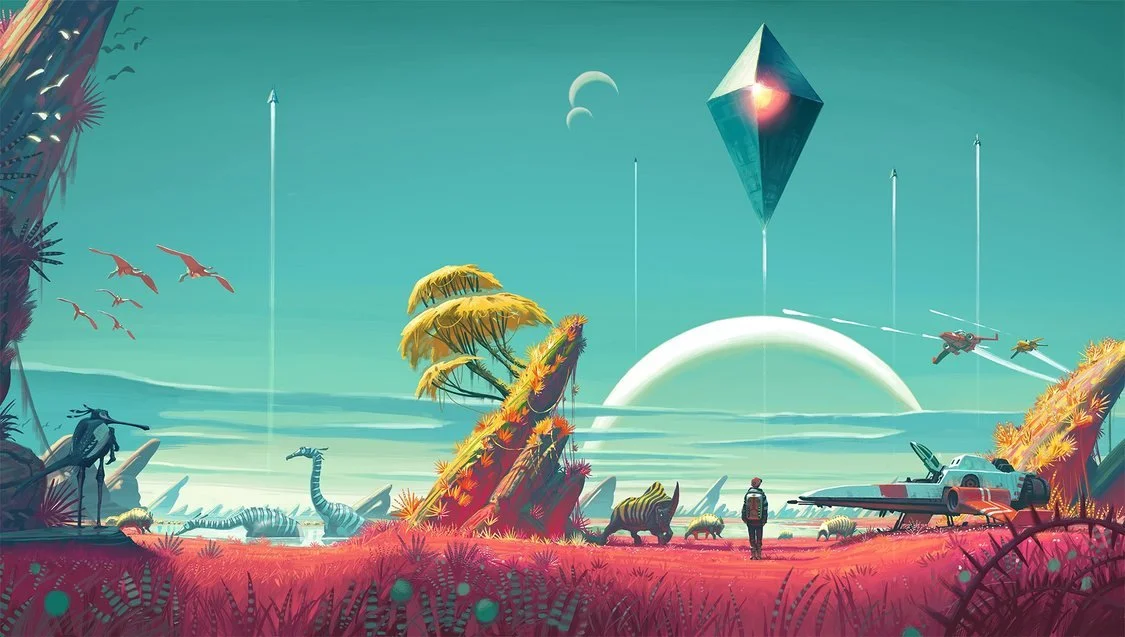The Limitless Unrealised Potential of No Man’s Sky
When No Man’s Sky was first revealed in December of 2013 it took the world by storm. It immediately set itself apart from mainstream games with its colourful look and soft aesthetic. Not only that, but the game promised seamless space travel across a functionally infinite number of planets that were all as large as you would want them to be. It was the sci-fi game everyone had always wanted; it was certainly the sci-fi game that I had always wanted. On top of all of this the game was being developed by Hello Games, a very small studio known for the Joe Danger series. This was shocking, not because the Joe Danger games weren’t good, but because they were so much smaller in scope than No Man’s Sky appeared to be.Going from 2D side-scrolling style games - as good as they may be - to making an entire 3D galaxy populated with an infinite variety of plant & animal life is quite the leap for any studio to make. However, Hello Games were confident that they could pull it off with their own proprietary algorithms that would build the worlds for them, meaning they wouldn’t have to design planets, flora or fauna themselves. Everything seemed well in hand, but almost three years later the game has come & gone and people barely seem to remember it, let alone still play it. For a game that boasted essentially infinite content you would expect people to still be enjoying it, not eagerly awaiting the next game as if the ‘biggest one ever made’ hadn’t just been released. So what went wrong?In my opinion the main reason for the (to put it politely) less than stellar reaction to the game is that everyone just let their imaginations run wild in anticipation, and then expectations just got out of control. I was absolutely guilty of this at first as well; as soon as creatures that vaguely resembled dinosaurs showed up in a trailer I was all in; Dinosaurs in space - how could I not fall in love with the game instantly? Just nevermind that nobody knew what playing the game even entailed at that point.The game was also the subject of an insane marketing push by Sony, who presented it as a huge, AAA game, despite the fact that it was being developed by a relatively tiny team who had never attempted something on this scale before. As such there was no way that the game would ever have the level of polish that one would expect from a game with a AAA budget. Not to say that the team behind No Man’s Sky weren’t skilled, but a team of 200 can do a lot more than a team of 20.Another part in the relentless hype machine was the gaming press at large, with many outlets getting caught-up in the hype just as much as the general public; it created the perfect storm of overblown expectations, as everyone was caught in a positive feedback loop.Finally, we get to the main culprit: the developers themselves. Of course, none of the above things did anything to help the situation, but this whole thing could have been avoided if the developers had simply delivered the game they promised, or at least something closer to it. In a monster post on Reddit, one user compiled an exhaustive list of all the features that were either shown or talked about that never made it into the final release of the game, including the very feature-rich day one patch. One of the major things that was cut was that physics will actually impact things in the game. For example: this would mean that planets would have different strengths of gravity, which would impact what can live & grow on the planet. It would also change what elements you could find on said-planet. This never made it into the game. The games trading system is also vastly simplified from what was promised, and is also mostly redundant given that most resources can be found on every planet.Along with those large discrepancies, there are small things like rivers not making it into the game, or planets with rings not making it into the game. All of these things compound on each other to make it feel like the developers were out to trick us. Nobody outside of a select few people really knows what went on behind closed doors to make the final game so different from the game that was shown off in videos & demos and that was talked about so fondly by the developers.Of course, none of this matters if you actually enjoy the game; I myself enjoy the game quite a bit as long as I have a podcast to listen to while I play. And although I haven’t played too much lately (Deus Ex is just so much more fun), I fully intend on making it to the centre of the galaxy at some point, even though I know that it will be immensely disappointing.For my money, though, the main takeaway from this whole situation is a lesson that people should have learned a long time ago: don’t pre-order games. There’s no need. People should wait until the verdict is in on whether the game is good or not, and then pick it up. Then we would never get into situations like this where thousands of people are ranting and raving, demanding refunds. Sometimes a game being “good enough” just isn’t good enough.


